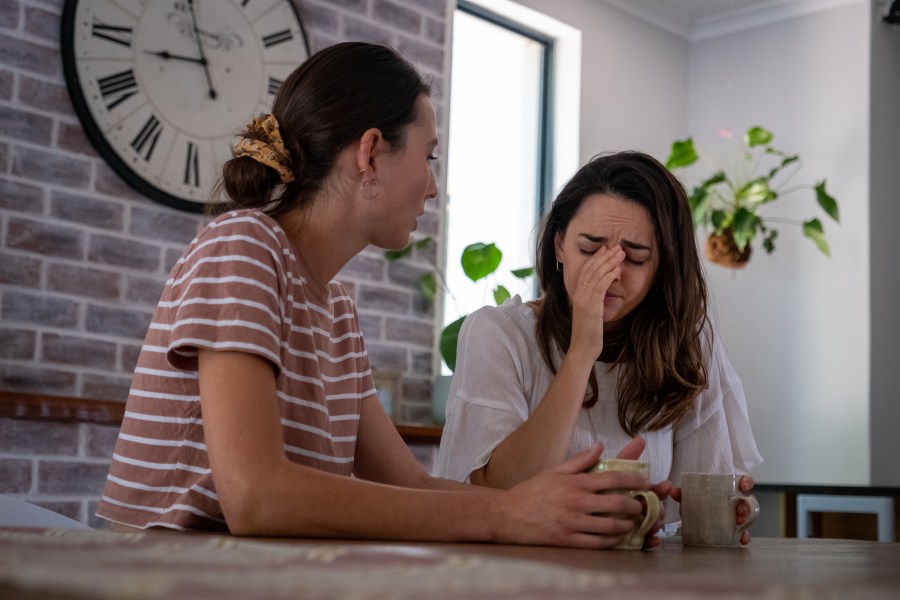Content Warning: This article discusses suicide. Please return to the homepage if you are not comfortable with the topic. If you are in distress and need someone to talk to, please call 988, text HELLO to 741741 or visit the crisis hotline’s website.
AUSTIN (KXAN) — September is National Suicide Prevention Month, and the American Foundation for Suicide Prevention (AFSP) wants to teach the public about what they can do to help make a difference and save lives.
“Talk Save Lives,” a program held by AFSP chapters across the U.S., teaches participants about suicide research, prevention and how to have a conversation with a person they’re concerned about.
Dr. Amy Grosso, a board member of AFSP Central Texas, said that the sessions are AFSP’s flagship training program. She noted that it is years old but was recently updated from participants’ feedback and updated research.
“I think too often when we talk about suicide or even mental health, we think only experts can have an impact,” Grosso said. “And the reality is, with suicide prevention, each of us every day can do things that impact the lives of others. Now we might not ever know that impact, but we learned that those little things do make a big difference.”
The program also has specialized versions of Talk Saves Lives, focusing on particular groups and topics. There are versions designed for the Latinx & Hispanic community, LGBTQ+ people and people in correctional facilities; and Grosso said that AFSP looks for more ways to expand the program.
“Through the years, AFSP has realized that Talk Saves Lives in itself is a great training, but sometimes we need to tailor it to different groups. Being able to direct that message, I think, is really important,” she said.
Dr. James Polo, a child psychiatrist, spoke with KXAN Monday about how suicide prevention efforts work with children.
“Remember, young kids are growing and developing. They’re learning about themselves. They’re learning about how to fit in, and when they’re struggling, they usually have challenges with both their emotions and behavior, and so simply talking with kids and helping them is what’s going to help set them up to be able to fit in and grow and thrive,” Polo said.
Grosso said that her mother died from suicide 26 years ago, which brought her into AFSP’s work.
“Often we want to know these things once it’s too late. Oftentimes we think suicide is not going to impact us, but we know majority of people in our country at some point are going to be impacted by suicide,” she said. “Being able to take one hour out and realizing that you could save a life because of that, and it might be a family member, I think that’s a pretty profound thing that we are able to do.”
AFSP also holds “Out of the Darkness” walks, with the Austin walk scheduled for 9:00 a.m. on Oct. 26.
Talking doesn’t cause, but prevents
An important note from Grosso is that talking about suicide prevention won’t lead someone to the act or increase suicidal ideation.
“That’s a common held myth, and so oftentimes people won’t even say the word,” she said. “The reality is, we know that asking someone if they’re thinking about suicide actually reduces suicide rates. The more we talk about it, and the more we open that door for other individuals to be able to talk about if they’re struggling, that it has such a profound impact.”
It’s a big reason why September is National Suicide Prevention Month — to reduce stigma and change how the American public understands suicide.
Social media has also impacted the words used to refer to suicide, with neologisms like “self unalive” emerging as a way to circumvent platforms’ content algorithms. But this can be a step backwards for reduce the stigma.
“We’re all trying to do our best to ensure that individuals aren’t getting information that is very harmful to them, and that not everybody has best intentions when talking about suicide,” Grosso said. “That happens, and we want to reduce that from occurring, and so I think it’s this balance of us learning with media and social media and all these things, and the best practice ways to talk about it, so that we’re being helpful, not harmful.”
